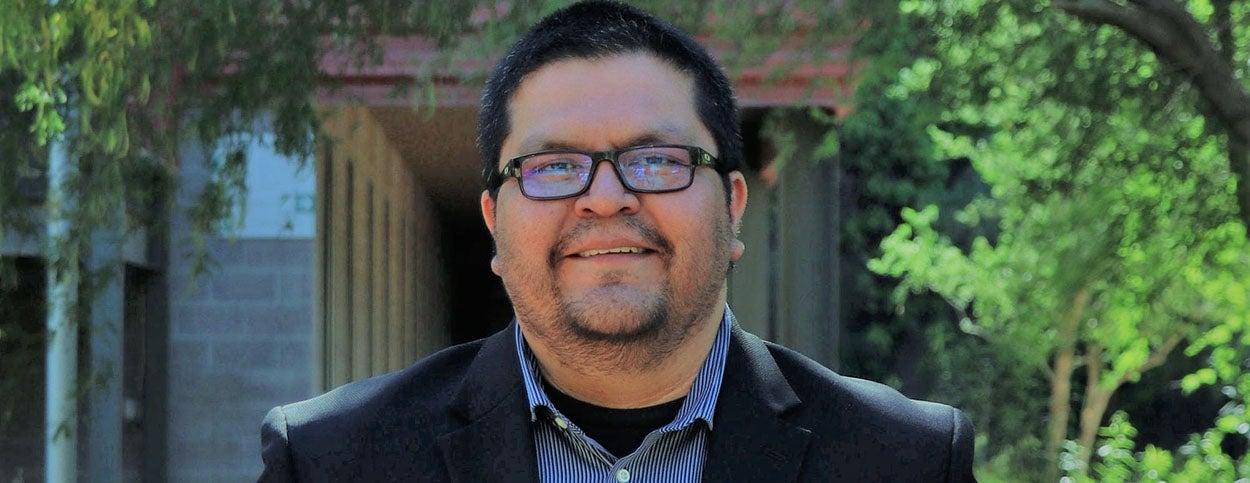
PhD candidate Jerome Clark is using Navajo storytelling to imagine a better future for his people
For Jerome Clark, stories are not just for bedtime. They are tools that can be used to imagine, and eventually help create, a future for the Navajo nation, his nation.
Clark is a PhD candidate in English Literature at ASU. He studies indigenous literature, focusing on the story traditions of the Diné (aka Navajo) tribe to which he belongs.
In his dissertation titled “Seeking Life; Diné storytelling as power, imagination and future-making,” Clark analyzes Navajo storytelling and examines how these stories are “used to suppress and proliferate life.”
“I’ve looked at a whole host of stories about how the stars came to be, about how kinship clans came to be, how the mountains came to be, how relationships came to be,” Clark said. “These stories define who the Navajo people are, how they define themselves and how they look to the future to continue defining themselves.”
Stories have power
Clark believes stories have the power to shape ideas, imaginations, and even actions.
For example, Clark examines stories of the Diné home, or Hooghan, to understand the importance of home and family within the Navajo nation and look at how the Navajo function and express themselves. He also uses these stories to argue for a return to the traditional Navajo way of building in order to displace the current, destructive methods.
Clarks hopes his research will have an impact on the future of the Navajo Nation, especially in addressing problems that the Navajo face such as climate change and colonialism.
Clark said his research is about “understanding how to live in these circumstances and about paving a path forward” for the Navajo people.
“Storytelling has the potential to create possibilities and create futures where there seems like there aren’t any,” Clark said. “Our storytelling practices are important to helping us construct a future beyond the now.”
Dr. Elizabeth Horan, Clark’s faculty mentor and professor in the ASU English Department, believes Clark's research will not only impact the Navajo Nation, but the entire field of indigenous studies as well.
“His research has the ability to remind people in Native American studies of how practice and decolonization theory is all related to traditional knowledge,” Horan said. “Native American studies is ready for someone who can bring together contemporary theory with this ancient knowledge.”
Clark is a first-generation college student who has needed to work throughout his college years to support himself financially.
“Education hasn’t always been the easiest,” Clark said. “It doesn’t always feel like it’s a place that’s intended for me and I’ve had to work hard to carve out a space for myself.”
Dissertation fellowship at Yale
His hard work has paid off.
Clark has been invited to continue his research at Yale as a member of the Henry Roe Cloud Dissertation Writing Fellowship program. The fellowship honors the legacy of Henry Roe Cloud, the first Native American graduate of Yale, and is offered to doctoral students “working on pressing issues related to the American Indian experience,” according to the fellowship website.
Clark said receiving the fellowship helped to validate his work and is a big encouragement for him to continue doing it.
“This fellowship is the highlight of my academic life,” he said.
Clark is excited to attend Yale as he has never been to school outside of Arizona. He is also eager to explore the university’s rare books library and utilize their Navajo specific material. Most of all, he is happy that he will be able to dedicate all of his time to his writing and research, without worrying about the financial impact.
Clark attributes much of his success to Horan. If it wasn’t for her support, advice, and feedback on his writing and research, Clark said he wouldn’t be where he is today.
Horan said that, of all the graduate students she has worked with, Clark needed her direction the least.
“He was an outstanding writer from the very start. He clearly knew the topic inside and out and he had a strong background in American Indian studies,” Horan said.
Clark believes Horan’s guidance was invaluable.
“Having her mentorship was an absolute necessity,” he said. “She models for me the type of faculty I would eventually like to be myself.”
After completing his fellowship, Clark wants to join a public institution and continue to engage in community work and in acts of future-making for the Navajo Nation.
Horan believes Clark can achieve this goal and would make a great faculty member.
“When he writes, he writes from a really steady grounding in Navajo philosophy as well as an awareness of Navajo history and a really strong concern for the community,” Horan said. “His writing is designed to further the field of indigenous studies. It’s been an honor to work with him.”
More stories from the Graduate Insider

Graduate funding deadlines for Fall

Humanities Week: The Critical Language Scholarship
